APRIL
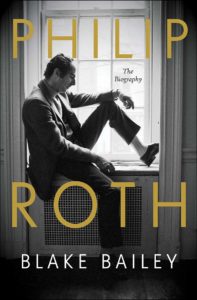
Blake Bailey, Philip Roth: The Biography, W.W. Norton (April 6)
Well, obviously. Bailey’s absolutely massive (880 pages!), years-in-the-making, fully authorized, definitive biography of Philip Roth is certain to be one of the biggest literary events of the season, and one everyone is likely to have an opinion about. Start anticipating that opinion now. –ET

Elizabeth Kolbert, Under a White Sky: The Nature of the Future, Crown (April 6)
Elizabeth Kolbert, who has produced some of our most vital writing on climate change (including the Pulitzer-winning The Sixth Extinction), now turns to the stories of those who are surveying what is left of the natural world and fighting, with skill and innovation, to preserve it. Her reporting spans the globe, from engineers in Iceland to scientists in Australia, while reconsidering the role of human intervention and its status in the scientific world. –CS
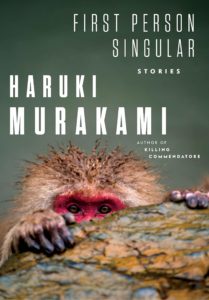
Haruki Murakami, tr. Philip Gabriel, First Person Singular, Knopf (April 6)
Hello, it is a new short story collection from Haruki Murakami, his first to be translated into English since 2017’s Men Without Women, and all, you guessed it, told in the first person singular. “Occasionally,” the publicity copy tells us, “a narrator may or may not be Murakami himself. Is it memoir or fiction? The reader decides.” So . . . Murakami does autofiction? I’m here for it. –ET

John Edgar Wideman, You Made Me Love You : Selected Stories, 1981-2018, Scribner (April 6)
It’s risky territory to call someone underappreciated or underread, as it often reveals more about the limits of the reader than the importance of the writer. So I’m just here to say that if you haven’t read John Edgar Wideman, this new selected stories would be a great place to start. This collection of 35 stories captures the full range of Wideman’s prodigious literary powers, from a formal audacity that places deep faith in its readers, to a perfect pitch for the fragmentary monologues of the human heart. Wideman reminds us that you can just as readily write about what’s closest to home as you can about the great unknowns of existence. –JD
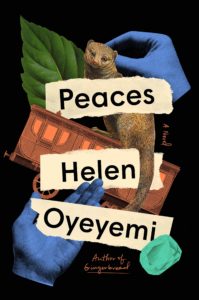
Helen Oyeyemi, Peaces, Riverhead (April 6)
Damn. Helen Oyeyemi must be the fastest literary novelist in the business. Which doesn’t bother me one little bit, because I’m always ready to read more from her. This latest concerns a hypnotist on a train-bound non-honeymoon with his boyfriend and their pet mongoose, and sounds like an absolute weirdo delight. As usual! –ET
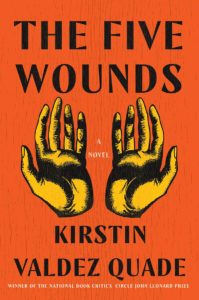
Kirstin Valdez Quade, The Five Wounds, W. W. Norton (April 6)
I am not the only person anticipating this debut novel by Valdez Quade, whose story collection Night at the Fiestas won the NBCC’s John Leonard Prize back in 2015. The other person? Oprah. Like her fellow chronicler of southwestern drift, Lucia Berlin, Valdez Quade’s stories are populated by hard luck characters on the hunt for a little tenderness, too often thwarted by their own worst tendencies. The Five Wounds, about “about a New Mexican family’s extraordinary year of love and sacrifice” promises more of the same, and Oprah and I are ready. –JD
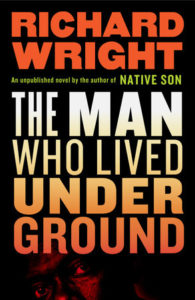
Richard Wright, The Man Who Lived Underground, Library of America (April 6)
A previously unpublished novel by Richard Wright is certainly cause for literary celebration. According to Library of America, The Man Who Lived Underground was written in the same period as Wright’s masterpieces Native Son and Black Boy, but has never before been published in full (a condensed version was included in the posthumous story collection Eight Men). “I have never written anything in my life that stemmed more from sheer inspiration,” wrote Wright of this novel. I can’t wait to read it. –ET
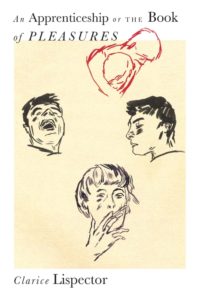
Clarice Lispector, tr. Stefan Tobler, An Apprenticeship, or The Book of Pleasures, New Directions (April 6)
In 1964, Clarice Lispector published The Passion According to G.H., a towering work of mysticism and metaphysics that would cement her reputation as a literary stylist and late-modernist innovator on a par with Borges and Nabokov, and that would prove to be something of a monster from whose shadow she would spend the next decade struggling to emerge. Two years later, having fallen asleep while smoking, Lispector awoke to find her apartment in flames, her clothes melted to her skin, her papers all but destroyed despite her efforts to save them. She suffered third-degree burns, was hospitalized for months; her writing hand was scorched and disfigured; and she would suffer enduring pain for the rest of her life. So while recovering, she produced… a romance novel? A passionate, tender work, An Apprenticeship is also perhaps Lispector’s most accessible. She herself admitted as much; in it, she remarked “I humanized myself.” –EF

Michaela Carter, Leonora in the Morning Light, Avid Reader Press (April 6)
Hello, it is a historical novel about the life of Leonora Carrington. (Read: Paris! Surrealism! Degenerates! Female Genius!) That’s all I need to know for it to slide right into my TBR stack. –ET
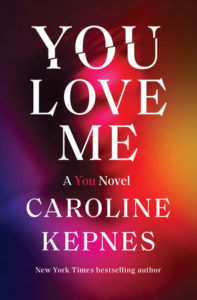
Caroline Kepnes, You Love Me, Random House (April 6)
I couldn’t wait to dive into the new novel from Caroline Kepnes, the third in her saga of Joe the psychopathic bookseller and his many true loves, and even though an advanced reading copy for this one was rather hard to come by. In You Love Me, Joe is out of prison but cut off from his son with Love Quinn, as he embraces his new exile from California by stalking a new love interest—the local librarian, Mary Kay. MK is married to an aging rocker and mother of a teenage girl, but of course Joe is out to break down her relationships and worm his way into her soul, while self-justifying all the while. Kepnes’s savage takedowns of pretentious blowhards continues to make Joe a more culturally aware Dexter, or perhaps a more romantic and humorous Hannibal, as he pillories the bad taste of his rivals and victims. –MO

Rachel Kushner, The Hard Crowd: Essays 2000 – 2020, Scribner (April 6)
Herein are collected two decades of literary journalism, cultural criticism, and memoir by the author of the lauded Telex from Cuba, The Flamethrowers, and The Mars Room. Come for the sharp portraits of Jeff Koons and Denis Johnson, the blistering reportage from refugee camps and illegal motorcycle races, or the light-with-laughter-yet-heavy-with-yearning paeans to classic cars and the San Francisco indie scene of the 1980s; stay for the opportunity to witness the maturation of one of the most intelligent and distinctive literary sensibilities of our time. –EF
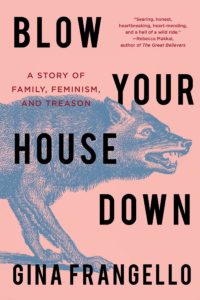
Gina Frangello, Blow Your House Down: A Story of Family, Feminism, and Treason, Counterpoint (April 6)
I’m a sucker for the sort of story arc in Blow Your House Down: Woman follows the rules. Woman becomes wife, mother. Woman is “good” in all things. One day, following crisis or unrelenting ennui, woman realizes that her life feels hollow or binding, so she sets about changing said life (sometimes in explosive fashion). I love this story enough in novel form, but better yet, Gina Frangello unravels it in all its reckless, transgressive, messy glory in this memoir about womanhood and misogyny, sex and joy. –ES
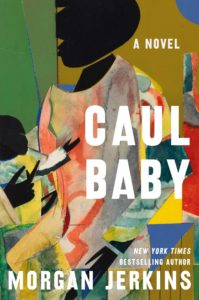
Morgan Jerkins, Caul Baby, Harper Books (April 6)
From two nonfiction books, including the New York Times bestseller This Will Be My Undoing, comes a debut novel, about familial connection, tradition, and the darker contours of human existence. An intergenerational narrative, Caul Baby follows Laila who desperately wants to become a mother but has several unsuccessful pregnancies. When she reaches a breaking point, she turns to the Melancons, a powerful Harlem family known for their caul, a priceless layer of skin that is the secret source of their healing power. What happens next is a mix of intrigue and betrayal, one that unearths the meaning of family and the bonds that tether us to one another. –RS

Gillian Flynn, Hamlet, Random House (April 8)
Supposedly, the long wait for Gillian Flynn’s Hamlet retelling, which was commissioned as part of the Hogarth Shakespeare project, is nearly at an end. That’s all I know, but as someone who loves Hamlet and admires Flynn, I hope that this is indeed our year. –ET
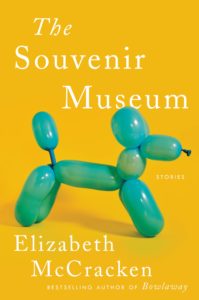
Elizabeth McCracken, The Souvenir Museum, Ecco (April 13)
McCracken is a tremendously sharp, soulful, and witty writer, rightfully considered one of finest American short story practitioners at work today (her 2019 novel Bowlaway is also magnificent). This latest collection of wry, emotionally complex family stories features a recent widower and his adult son in search of puffins on a Scottish island, an actress (known for playing a villain on a children’s TV show) ushering in the New Year with her good-for-nothing half-brother, and two fathers taking their toddler on an ill-fated trip to a German-themed Galveston water park. –DS
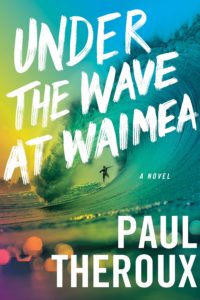
Paul Theroux, The Under the Wave at Waimea, HMH (April 13)
A novel following a sexagenerian surfer as he confronts his own mortality, aging, and privilege. When the surfer accidentally kills a man near Waimea, he becomes determined to uncover the person’s life story, one that unexpectedly intersects with his own (before the accident, of course). Set in Hawaii, the book offers a different perspective on what many consider an Edenic place. –RS
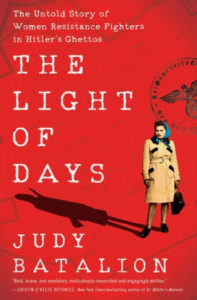
Judy Batalion, The Light of Days: The Untold Story of Women Resistance Fighters in Hitler’s Ghettos, William Morrow (April 6)
The risk in lionizing individual heroism (especially in contemporary America!) is that we lose sight of the massive power imbalances that require such heroism in the first place. But it is hard not to draw inspiration and courage from the story of Renia Kukielka, the “weapons smuggler who risked death traveling across occupied Poland” who sits at the center of Judy Batalion’s chronicle of women resistance fighters WWII Poland. At great personal risk, a group of young Jewish women did everything they could to undermine Nazi power in occupied Poland, bombing train lines, taking care of sick children, and assassinating members of the Gestapo. Of course, Stephen Spielberg will be adapting this one for the screen. –JD
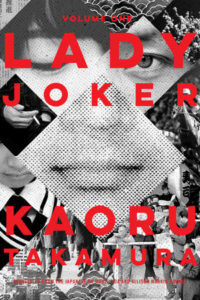
Kaoru Takamura, Lady Joker, Soho Crime (April 13)
Kaoru Takamura’s magnum opus Lady Joker is already considered classic literature in her native Japan, where it has also been the subject of several adaptations since its mid-90s publication. This year, thanks to the tireless efforts of Soho Press and several translators, Lady Joker will finally appear in English, so we can all have a chance to read a work that earns frequent comparisons to L.A. Confidential in its scope. Lady Joker follows five racetrack regulars as they hatch a plan to kidnap a beer industry titan, seeking vengeance after one loses a grandchild and blames the death on the company’s discriminatory hiring practices. –MO

Bolu Babalola, Love in Color: Mythical Tales from Around the World, Retold, William Morrow (April 13)
A Nigerian goddess who longs to be seen, a young business woman who makes leaps in her love life, an influential Ghanaian spokeswoman who must decide if she will be true to her heart—these are just some of the characters you’re set to encounter in Babalola’s debut short story collection. Centering the folktales of West Africa, Babalola retells some of the most enduring mythologies with a refreshing voice. And though she also draws on Greek myths and legends of the Middle East, Babalola is keen to decolonize tropes inherent to these stories. This book is a celebration of love—its challenges and its sweet promise. –RS
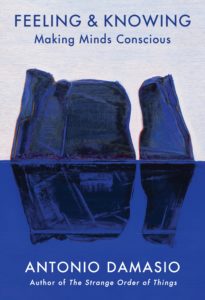
Antonio Damasio, Feeling & Knowing: Making Minds Conscious, Pantheon (April 13)
I hate to break it to you but the problem of consciousness is getting harder, not easier (as a lapsed philosophy grad, I say this with a heavy heart). As we hurtle ever-nearer to the Singularity the threshold for what constitutes autonomous sentience grows fuzzier—so fuzzy, in fact, that most philosophers have just kind of walked away from the problem. Not so Antonio Damasio, who is also a professor of psychology and neurology. For Damasio, the answer lies in a synthesizing of disciplines, and he draws from the latest in the hard sciences—biology, neuroscience—to shed light on the frequently recondite explorations of consciousness, the legacy of centuries of philosophy. –JD
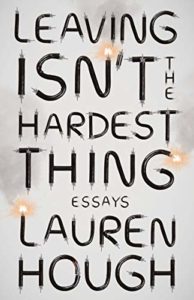
Lauren Hough, Leaving Isn’t the Hardest Thing: Essays, Vintage (April 13)
Folks have been gushing about Lauren Hough’s memoir-in-essays for what feels like years now thanks to the time-warp of 2020, and I can’t wait to get my hands on a copy. In a wide-reaching collection of tales, she writes about growing up in a nomadic cult, confronting homophobia in the Air Force, resentfully installing cable for Dick Cheney, and so much more. In a glowing Goodreads review, Roxane Gay wrote that “this is one of those rare books that will instantly become part of the literary canon.” Okay, then! –ES
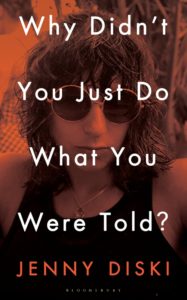
Jenny Diski, Why Didn’t You Just Do What You Were Told?: Essays, Bloomsbury (April 20)
Jenny Diski was a brilliant writer—funny and fearless, she spent her last years chronicling her own cancer diagnosis in her column in the London Review of Books. The essays in her new collection, selected by her editor and friend Mary-Kay Wilmers (a brilliant essayist in her own right), have been described as “virtuoso performances,” and “small masterpieces.” From Highgate Cemetery to the icebergs of Antarctica, Diski is a writer that if you’re not familiar with, you must remedy. –EF
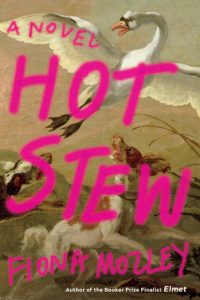
Fiona Mozley, Hot Stew, Algonquin (April 20)
I was floored by Mozley’s debut novel, Elmet, which I maintain not enough people read (at least in this country—it was shortlisted for the Booker Prize, which usually means the Brits are On It), so I’m hoping her sophomore effort will bring her the stardom she deserves. In it, Mozley trades the Yorkshire forest to London’s Soho, where a wealthy developer is trying to turn an old building—which currently houses a brothel—into a luxury condo. The drama that they drum up is, apparently, the titular hot stew. Sounds amazing. Also: that cover is killing me. Can’t wait. –ET
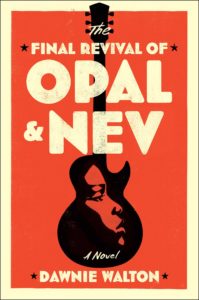
Dawnie Walton, The Final Revival of Opal and Nev, 37 Ink (April 20)
Dawnie Walton has crafted a rock ‘n roll novel for the ages. In The Final Revival of Opal and Nev, we’re introduced to Opal, a pioneer of Afro-punk with a shaved head and outrageous costumes, who teamed up with British singer-songwriter Nev for one glorious album, until a disastrous showcase ended their partnership when it had barely begun. Decades later, a music journalist with a personal connection to the band is working on a book about the band’s short-lived history when she discovers explosive new info about the disastrous concert that broke up the band. –MO
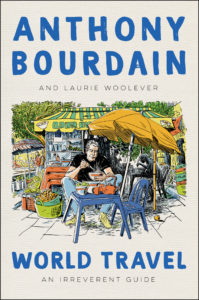
Anthony Bourdain and Laurie Woolever, World Travel: An Irreverent Guide, Ecco (April 20)
Anthony Bourdain’s signature voice—his enthusiasm for exploration and ability to search out unique experiences—is the main draw of World Travel, which offers anecdotes and travel advice from the late chef and travel writer. The book also provides essays from Bourdain’s friends and family, honoring his life’s work of connecting people, and cultures, through cuisine. –CS
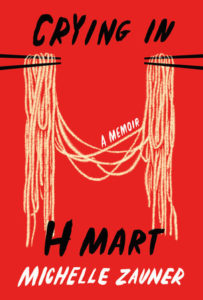
Michelle Zauner, Crying in H Mart: A Memoir, Knopf (April 20)
Michelle Zauner, aka Japanese Breakfast (if you know, you know), has expanded her wonderful 2018 New Yorker essay about her mother’s death into a full-length memoir, in which she writes about growing up Korean American in Eugene, Oregon, her life in food and in music, her relationship with her mother, and her mother’s cancer. I’m looking forward to reading more from Zauner. –ET
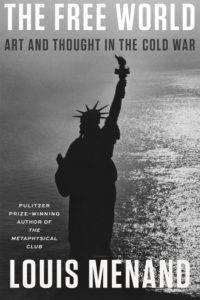
Louis Menand, The Free World: Art and Thought in the Cold War, FSG (April 20)
The history of ideas is never fixed, final: like amateur genealogists we are always encountering unexpected connections and recognizing previously illegitimate claims. To understand the way “we” think now, is to understand how we got here, which is why I’m looking forward to critic Louis Menand’s expansive survey of post-war intellectual life. From the flat gallic flare of café existentialism to the multi-disciplinarian playfulness of the Black Mountain School, Menand charts a course back and forth across the Atlantic, taking on passengers as diverse as Hanna Arendt, Elvis Presley, James Baldwin, and Susan Sontag, revealing how each, in their way, contributed to the rise of a true American culture. –JD
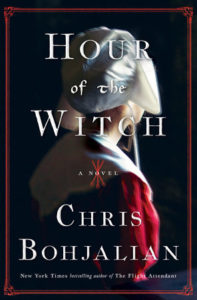
Chris Bohjalian, Hour of the Witch, Doubleday (April 20)
There are a whole lot of books coming out this year about witches, and each one looks truly magnificent. In Bohjalian’s latest, a young Puritan woman trapped in a loveless marriage in 17th-century Boston is desperate to get out of her unpleasant union. But will her methods subject her to scrutiny and suspicion even more dangerous than her husband? Chris Bohjahlian is also the author of Water Witches, a story of dowsers, that’s recently been released in a new 25th anniversary edition if you can’t wait till April to get your witch on. –MO
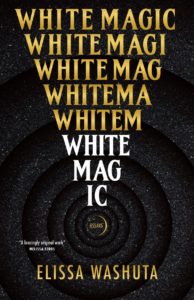
Elissa Washuta, White Magic, Tin House (April 27)
Over the past few years, I’ve had the great luck of listening to Elissa Washuta read sections from her forthcoming book, making it my most anticipated read of 2021. (You can read the opening for yourself over at Guernica.) The way she obsessively plumbs her subjects—from Red Dead Redemption to a Stevie Nicks YouTube video to a conference for magicians in Columbus, Ohio—in order to explore love, trauma, and colonization leaves no doubt that she is, indeed, a powerful witch. –ES
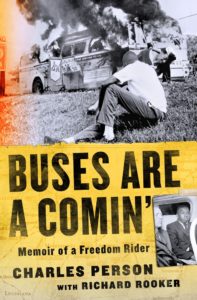
Charles Person with Richard Rooker, Buses Are a Comin’: Memoir of a Freedom Rider, St. Martin’s Press (April 27)
A “front-row” historical view of one of America’s greatest struggles—desegregation. Written by a Civil Rights Movement’s pioneer, Buses Are a Comin’ follows Charles Person, one of the youngest Freedom Riders who left D.C. by bus in 1961 for New Orleans. It is a book that dives deep into a dark past, but also shows what it means to create a more radical future. –RS
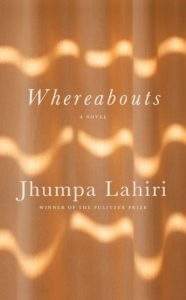
Jhumpa Lahiri, Whereabouts, Knopf (April 27)
This might sound ridiculous, but I’ve already cleared some space on my bookshelf for this beauty. Perhaps this will seem less ludicrous, Reader, once I remind you that this is the first novel Lahiri has published in ten years. And even more, Whereabouts is the first novel Lahiri wrote in Italian and translated into English. The protagonist of this tale negotiates stillness and movement, and community and alienation, as she grapples with her father’s untimely death. She ultimately forges a relationship with the sea and her transformation is inevitable. –RS

Dominique Barbéris, tr. John Cullen, A Sunday in Ville-d’Avray, Other Press (April 27)
In this book, two estranged sisters meet-up, one of whom has had a romantic “encounter” with life outside her suburban, mapped-out provincial life on the outskirts of Paris. She relays the encounter to her sister one quiet afternoon when there’s nobody to interrupt them. There’s no high turret of emotion, but rather the wandering of an apprehensive heart: excited, romantic, secret, with an undercurrent of disappointment and mystery, all bound up in Barbéris’s atmospheric prose that maps the unrealized dreams of women. –KA



